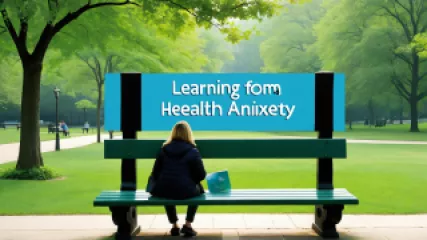Learning from Book and Movie Lessons for Managing Health Anxiety
Introduction
Health anxiety, also known as illness anxiety disorder or hypochondria, is a condition characterized by excessive worry and fear about having a serious medical condition. It can significantly impact a person's life, causing distress, impairing daily functioning, and leading to frequent doctor visits and medical tests.
Managing health anxiety can be challenging, but sometimes, unexpected sources can provide valuable lessons and insights that can help individuals cope with their anxiety. This article explores the concept of learning from books and movies and how we can apply their lessons to overcome health anxiety.
1. The Power of Perspective
One valuable lesson we can learn from books and movies is the power of perspective. Many stories feature characters who face difficult challenges, including health-related issues. By following their journey, we gain a new perspective on our own struggles.
For example, in the book The Fault in Our Stars by John Green, the protagonist, Hazel, battles cancer while finding love and friendship. Through her story, we learn the importance of cherishing the present moment and finding joy in small things, despite the uncertainty of the future.
This lesson can be applied to health anxiety by reminding ourselves to focus on the present rather than constantly worrying about what might happen in the future. Embracing gratitude and finding joy in everyday life can help shift our perspective and reduce anxiety.
2. Building a Support Network
Another important lesson we can learn from books and movies is the value of building a support network. Many characters rely on the support and guidance of their friends, family, or healthcare professionals to navigate through challenging health situations.
For instance, in the movie Silver Linings Playbook, the main character, Pat, suffers from bipolar disorder. Throughout the film, he forms a support network consisting of his therapist, family, and new friends. They provide him with emotional support, encouragement, and guidance on his journey to recovery.
Similarly, individuals dealing with health anxiety can benefit from building a strong support network. This may include trusted friends, family members, therapists, or support groups. Having a support system in place can provide reassurance, understanding, and practical advice when facing health-related anxieties.
3. The Importance of Self-Care
Books and movies often highlight the significance of self-care in managing physical and mental well-being. Characters who prioritize self-care tend to demonstrate resilience and better coping mechanisms when faced with health challenges.
Consider the book Eat, Pray, Love by Elizabeth Gilbert, where the author embarks on a journey of self-discovery and healing after a difficult divorce. Throughout her travels, she learns the importance of nourishing her body, mind, and soul through healthy eating, meditation, and embracing new experiences.
Individuals struggling with health anxiety can adopt self-care practices to promote their well-being. This may include engaging in regular physical exercise, practicing mindfulness or meditation, maintaining a balanced diet, getting enough sleep, and engaging in activities that bring joy and relaxation.
4. Challenging Negative Thoughts
Negative thoughts and cognitive distortions often fuel health anxiety. Books and movies can teach us valuable strategies for challenging these distorted thoughts and promoting more positive thinking patterns.
In the novel The Alchemist by Paulo Coelho, the main character, Santiago, faces numerous obstacles and self-doubt on his quest for personal fulfillment. Through his journey, he learns the power of believing in oneself and challenging negative beliefs that hinder progress.
Similarly, individuals managing health anxiety can benefit from challenging their negative thoughts. This can be done by examining the evidence for and against their anxious beliefs, seeking alternative explanations, and practicing thought reframing techniques. By challenging negative thoughts, individuals can reduce anxiety and cultivate a more positive mindset.
5. Seeking Professional Help
While books and movies can provide valuable insights, it's important to remember that they are not a substitute for professional help. If you are struggling with health anxiety, it is advisable to seek guidance from a qualified mental health professional.
A mental health professional can provide specialized guidance and support tailored to your individual needs. They can help you develop personalized coping strategies, explore underlying causes of anxiety, and provide evidence-based treatments such as cognitive-behavioral therapy (CBT) or anxiety relief programs.
Conclusion
Books and movies have the power to entertain, inspire, and teach us valuable lessons. When it comes to managing health anxiety, we can draw insights from these sources to gain new perspectives, build a support network, prioritize self-care, challenge negative thoughts, and seek professional help when needed.
By applying the lessons learned from books and movies, individuals can develop effective strategies to overcome health anxiety and improve their overall well-being. Remember, everyone's journey is unique, and it's essential to find what works best for you. Embrace the wisdom shared in stories and use it as a tool for growth and resilience in your own life.






